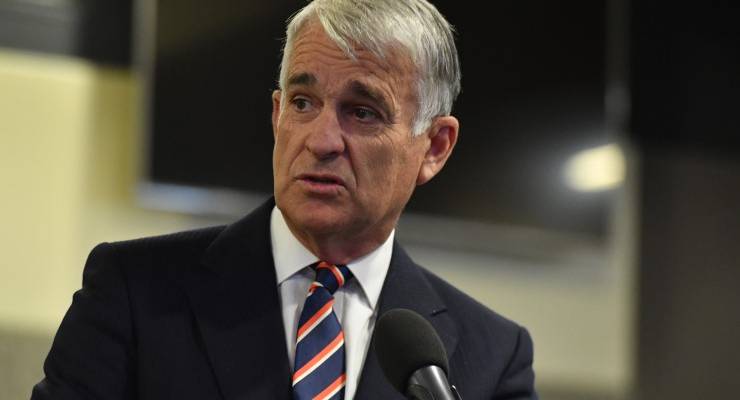
It’s being called a comeback. Former Nationals leader John Anderson is seeking a NSW Senate spot 14 years after leaving politics.
But the “man of great heart”, as former Labor leader Kim Beazley once described him, has undergone somewhat of a political transformation since his time as John Howard’s steady-handed deputy PM.
Once known as a humble team player in a government that was characterised by Howard’s folksy brand of conservatism, Anderson has become a conduit for some of the world’s most radical and disputed thinkers and ideas.
Anderson has raised his media profile in recent years, starting a podcast and YouTube channel in which he has interviewed some of the right’s most controversial figureheads, including conservative British historian Niall Ferguson and Canadian YouTube psychologist Jordan Peterson.
Anderson makes the videos in a Sydney studio with the help of two unnamed benefactors. They’re well produced, and centre around his concern about “identity politics”, something he says is poisoning Australia’s future.
So what can we learn about Anderson 2.0 from these interviews?
Jordan Peterson
One of Anderson’s highest-viewed YouTube videos is his interview with psych professor turned right-wing internet idol Peterson. Anderson told The Australian they had become friends. Peterson’s campaign against political correctness and liberal-minded weakness appears in sync with Anderson’s newfound role as an advocate for libertarianism and free speech.
Black Lives Matter
Anderson has spoken out against the Black Lives Matter movement, claiming it has played “fast and loose” with the facts regarding police brutality.
In a podcast and op-ed in The Australian last year he said it was “doubtful” whether the movement would have gained as much traction “if there was nothing at all wrong in the African-American community”.
Anderson claims that “merely appealing to racism” to explain inequality and high levels of incarceration among African-American men “hadn’t proved to be very helpful over the years”.
“There’s more to the story: it’s a problem with men in general, and African-American men are bearing the brunt of it. The problem is fatherlessness, and it’s increasingly being recognised not only as the greatest problem facing African-Americans, but America itself.”
Men’s rights
Through his focus on fathers, Anderson has aligned himself with the men’s rights movement, giving a platform to Warren Farrell, considered by some to be the father of the men’s rights movement. Farrell has made the case that the primary victims of gender-based discrimination are men — casualties of a society that relies on their sacrifices while ignoring their suffering.
Trans rights
In 2018 Anderson said the “explosion” in the number of children identifying as transgender was “deeply concerning”.
He has also criticised the ACT’s move to pass a bill banning gender conversion therapy, telling Peta Credlin on Sky: “This offensive and very badly drafted piece of legislation is strangely enough at very best completely meaningless, but at worst potentially unbelievably dangerous.”
Peter Ridd
Anderson has celebrated the work of Peter Ridd and his research on the “flawed IUCN assessment of the Great Barrier Reef”.
In 2018, after Ridd was sacked by James Cook University, Anderson interviewed former Labor government minister Peter Baldwin about the “crisis of political correctness” in the academy which was destroying the careers of distinguished academics.
Evangelical Christianity
Anderson has told The Australian he’s recently felt a responsibility to “own” his evangelical Christianity in the public space.
“I believe we have a problem in our nature of selfishness, and the antidote to that is Christ,” he said. “We are not equipping young people now with a knowledge of their roots, and when they do hear of these things they are demonised. Nobody learns of the Christian role in the abolition of slavery or the move to educate the poor.”
Let us know your thoughts on John Anderson’s return by writing to letters@crikey.com.au. Please include your full name to be considered for publication in Crikey’s Your Say section.








Crikey is committed to hosting lively discussions. Help us keep the conversation useful, interesting and welcoming. We aim to publish comments quickly in the interest of promoting robust conversation, but we’re a small team and we deploy filters to protect against legal risk. Occasionally your comment may be held up while we review, but we’re working as fast as we can to keep the conversation rolling.
The Crikey comment section is members-only content. Please subscribe to leave a comment.
The Crikey comment section is members-only content. Please login to leave a comment.